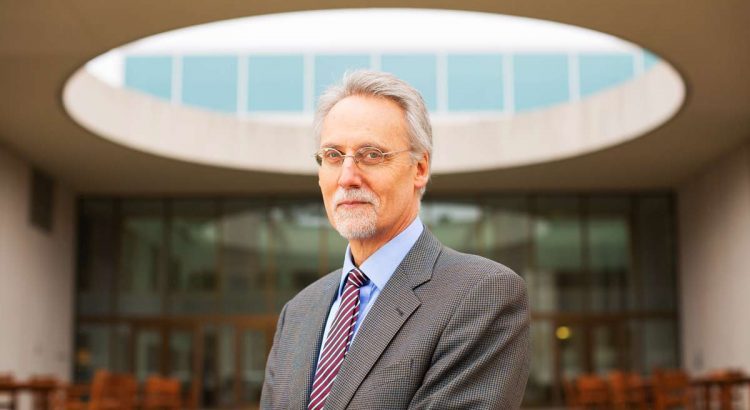It makes little sense to eliminate a program that has demonstrable benefits for the economy with fairly low cost to taxpayers, says economist Gale Boyd, who has studied energy efficiency in the industrial sector for over 25 years. “It seems short-sighted at best to eliminate a program like this,” he says. “If we’re interested in revitalizing the manufacturing sector, there may be lots of ways to do that, but having companies become more profitable by being more energy efficient, I think, is a smart strategy.”
Read More in ViceCategory: Business

Trump’s SEC Pick, a Lawyer for Goldman, To Face Skepticism
Law professor James Cox, a close Securities and Exchange Commission-watcher, takes a somewhat positive view of President Trump’s selection of Jay Clayton to lead the SEC. “This may be a good time for that kind of person,” Cox says, suggesting that Clayton is likely to steer the SEC back to its more fundamental responsibilities instead of its more recent task of writing rules under the Dodd-Frank law.
Read More at ABC/The Associated Press

Was The Trans-Pacific Partnership Bad For The U.S.?
“President Trump’s knee-jerk nativism has blocked progress due to fear of change. Nations that turn inward and reject trade harm themselves and the world,” writes economics professor Edward Tower. “On the other hand, globalization since World War II shows that nations that open markets and embrace agreements such as the TPP strengthen their economies and spread wealth and liberty to more people around the world.”
Read More on Wallet Hub
Know the Basics of Why Obamacare Stumbled Before Adopting Trumpcare
“Of course, it’s too much to ask these days for a reasoned discussion of the underlying economics of health care in Washington. However, without such a discussion, the most likely result will increase the cost of health care to you and your family. Real reform will require a hard look at the economics of our health care system — its strengths and its failings,” writes Dr. Kevin Schulman, a professor of medicine.
Read More in The Plain Dealer
Cuts To EPA, NIH Budgets Would Hurt Local Economy
President Donald Trump’s proposed federal budget includes cuts to two federal agencies that could make a noticeable dent in the Triangle economy if it wins congressional approval. Dr. Nancy C. Andrews, dean of the School of Medicine, says in a statement she hopes Congress rejects any reduction of NIH funding and funding for other programs critical to people’s health and well-being. “Everywhere you turn, there is clear evidence of the impact of science and biomedical research on human lives,” she says.
Read More in The News & Observer
CFOs To Trump: Stop Tweeting, Lose Border Tax
Chief financial officers in the United States are concerned about how President Donald Trump’s off-the-cuff Twitter posts and public comments affect business, a new Fuqua School survey finds. Results also show that CFOs are feeling the most confident about economic growth than they’ve been in more than a dozen years, and they strongly support several of the president’s initiatives. “(CFOs) don’t like the fluctuations and uncertainty that result from how President Trump communicates to the public, but they say many of his ideas will be good for business, even some of the more controversial ones,” says finance professor John Graham, director of the survey.
Read More at Fuqua School of Business
How to Use Trump’s Travel Ban at Business School
Politics can be a thorn in the side of companies and universities. Bill Boulding, dean of The Fuqua School of Business, thinks he can use it to build better leaders. “It’s not our job to take a political position on these decisions as a business school, and I’m not doing that on this particular issue,” Boulding says. “However, the political decisions that get made will affect your ability as a business leader to create great teams, to create a sense of belonging on those teams.”
Read More in Bloomberg
Trump’s Repeal of Stream Rule Hurts Climate, Species
When he rolled back a regulation to protect streams from mining pollution last week, President Donald Trump made good on his promise to ease up on coal mining. “This repeal is ignoring a lot of the recent science that clearly documents a lot of these downstream impacts,” says biology professor Emily Bernhardt, who has studied the ecological effects of coal mining.
Read More at Inside Climate News

In Corporate Activism, Authenticity is Key
When CEOs speak out on a social or environmental issue, they should stay true to their personal and professional values and not seek simply to strengthen their brand, leaders involved in corporate activism say. “This is a core strategic issue,” says Fuqua School of Business professor Aaron Chatterji. “Every firm is thinking about this now.”
Read More From Fuqua School of Business
Inside CEO, Consumer Activism In Trump Era
Donald Trump represents the ultimate intersection of business and politics, and within that crisscross sits a new type of business activism. Corporate CEOs have been vocal about the president’s action on immigrants and refugees. Aaron Chatterji, associate professor at The Fuqua School of Business, is interviewed about the trend.
Listen on WFAE
Senate Confirms Former Goldman Sachs Banker as Treasury Secretary
In the Trump administration, “there aren’t many people who have experience doing the kinds of jobs that most Americans go to every day,” says Sanford School professor Nicholas Carnes. “The advice that he’s going to be getting – policies are probably going to be heavily slanted in the interests of more wealthy groups.”
Read More in The Christian Science Monitor
Trudeau Visits U.S. With Two Aims
Canadian Prime Minister Justin Trudeau on Monday opened talks at the White House with U.S. President Donald Trump, seeking to nurture economic ties while avoiding tensions over issues such as immigration on which the two are sharply at odds. “You don’t have to be a genius to see there are some stark differences between them,” says Sanford School professor Stephen Kelly, former U.S. deputy chief of mission to Ottawa.


